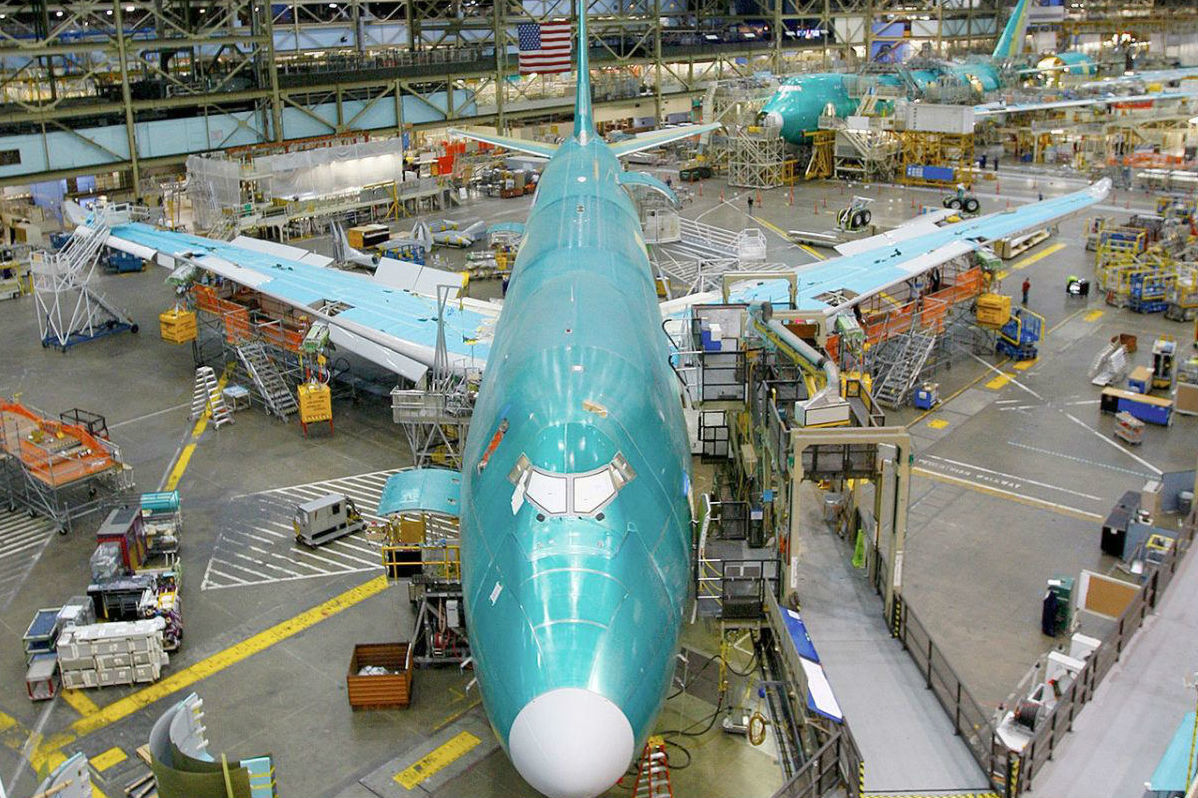A key selling point of I-732—the carbon-tax measure on the ballot this fall—is that for every dollar it raises by putting a price on climate-warming emissions, it cuts another dollar elsewhere in Washington’s tax code.
By designing the measure to achieve so-called “revenue neutrality,” I-732 backers hope to present voters with an offer they can’t refuse: to address climate change in the state without raising taxes or driving away jobs. And overall, analysis shows, the measure would make Washington’s tax code more progressive—i.e., in general it would shift more of Washington’s tax burden away from the poor and toward the rich, who tend to create more carbon pollution.
However, due to a quirk in Washington’s tax code, that overall theme may not hold true when it comes to the aerospace industry—in particular the Boeing Company, which analysis shows will disproportionately benefit from a cut to the Business and Occupation Tax, possibly to the tune of hundreds of millions of dollars.
Carbon Washington, the group behind I-732, has for months acknowledged the big benefit the aerospace industry would see through its tax plan, due to something called the Multiple Activities Tax Credit, which is meant to encourage Boeing to sell its planes in Washington. Testifying before a legislative committee last February, Carbon Washington co-chair Joe Ryan called the Boeing tax break an “error.” The Sightline Institute, an environmental think tank that has supported the measure, called the tax break “unintentional,” but concluded it was very real—totaling as much as $200 million a year for the state aerospace industry.
Both Ryan and Sightline suggested that the legislature could rewrite I-732 to eliminate the tax break. But Yoram Bauman, founder and co-chair of Carbon Washington, tells Seattle Weekly that the group is “walking back” their conclusion that the Boeing tax break could have been avoided, based on further analysis by state tax experts. In other words, it may not have been a mistake after all, but a reality of fiddling with corporate taxes in a state where Boeing plays by its own set of rules. “The bottom line on Boeing is, it’s complicated. We have not been able to get a clear answer on whether something could have been done differently,” Bauman says.
Bauman was quick to note that, as designed, at least some of the tax cuts Boeing will see under Carbon Washington’s plan will be offset by new taxes it pays through the carbon tax. “Think about all the jet fuel they burn,” Bauman says. In that way, I-732 is working precisely as intended.
Still, as Sightline puts it, I-732 “gives a big windfall to Boeing,” and that could prove a bitter pill for some voters to swallow. Many voters are still miffed by the generous tax package passed by the legislature and signed into law by Gov. Jay Inslee in 2013 in exchange for Boeing committing to build the 777X in the state.
“Voters who were unhappy” with the 2013 Boeing tax cuts, says Bauman, “should not take that out on 732. They should take it out on the legislature and the governor who gave big tax cuts to Boeing in the first place.” But Jeff Johnson, president of the Washington State Labor Council and an outspoken critic of I-732, disagrees, saying labor feels betrayed by continued job cuts at Boeing following the 2013 tax package, and that his members would be loath to show the company any more generosity. “People are feeling pretty taken advantage of,” he says. “That’s part of the liability of I-732.”
If nothing else, the Boeing issue shows the tricky path that Carbon Washington is attempting to walk with its ballot measure: By giving both the left and the right something to like (reduced carbon emissions; tax offsets), it also gives both sides something to take issue with (corporate tax cuts; new energy restrictions).
While the measure has garnered bipartisan support, labor activists like Johnson argue any serious climate-change plan should raise new state revenue to fund green-energy infrastructure (built, presumably, by a union workforce). Meanwhile, it’s unclear whether Washington business groups will give Carbon Washington any credit for its efforts in reducing the impact of a carbon tax on industry. To date, not one but two No on I-732 groups have registered with the state, both largely backed by industry groups.
Bauman points out that the main No campaign has raised just $261,000, which he argues is “at least two zeros less than what conventional wisdom says” a carbon tax should draw in opposition. This, he says, suggests that industry groups recognize that I-732 isn’t a bad deal for them and are sitting the campaign out. “Have the oil companies contributed to the No on 172 campaign? The answer is no,” he says. (A spokesman for the No on 172 campaign rejects this analysis, saying in an e-mail that “I-732 is opposed by hundreds of businesses, labor unions, environmental nonprofits, and social-justice groups.”)
Another business not jumping into the fray is Boeing itself. A spokesman says that it will not be taking a stance on I-732.
dperson@seattleweekly.com








